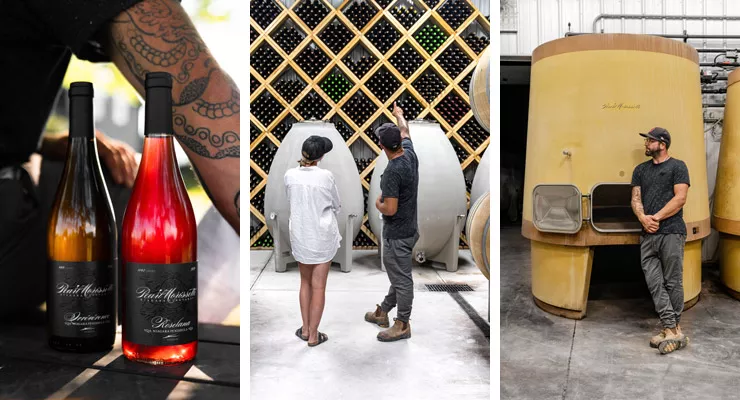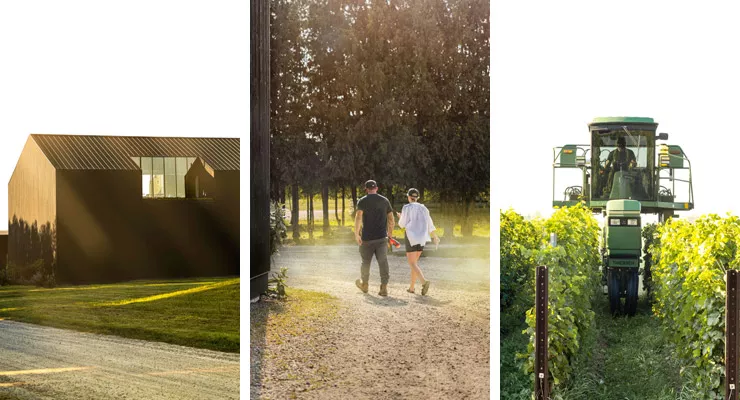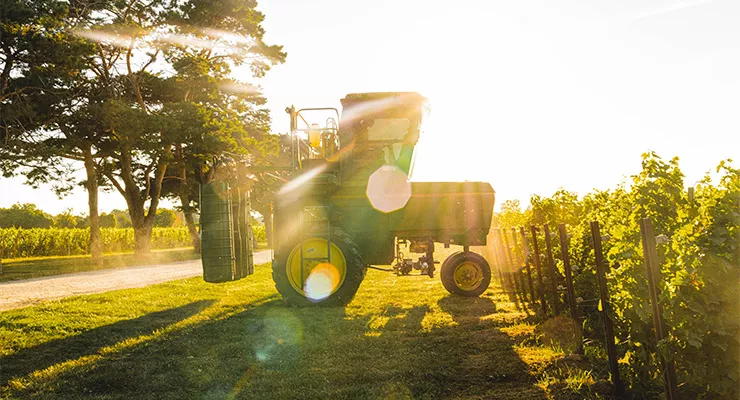At CANNA we’re excited to share passionate grower stories from across Canada that resonate with our community and inspire us to “grow big or grow home”.
THE JOURNEY
Andrew, please tell us a little about who you are
My name is Andrew Sullivan, and I'm the Vineyard Manager at Pearl Morrisette Winery. My father and grandfather were cash crop farmers, growing a lot of barley, wheat, oats, and hay. They were also fishermen, so they usually fished in the morning. I've been driving tractors since about the age of five.
What's your unique contribution to the world of wine?
Andrew: My specialty is organic and biodynamic viticulture. I believe I bring a lot of passion and hard work. I've been given a platform here to grow as a viticulturist and a winemaker, but also as a fan of wine. I get to experience wine in its more raw and natural form than many other producers do. I think we, as a community of viticulturists, tend to band together. We rely on each other a lot for knowledge, for observation, and for answering questions we may have. But I also think that we are somewhat separated from the production side, the winemaking side, and the general public.
The fun part really starts when the grapes are harvested and they're already in the winery. Not many people are interested in spending three or four months pulling weeds in a field, tucking grape shoots into wires, spraying, or cultivating and spending 14 hours on a tractor.
“It's not as illustrious or as glitzy as some people want, but I think that it takes someone who's truly passionate and understands what the end result is. All the work that I do, all the effort and passion that I put into it, is so that when this grape turns into wine and gets into the bottle, people who have never tasted our wine or taste our wine every year, they love it. Or maybe they hate it, but that's okay too.”
That subjectivity that comes with wine is really interesting. We can't always decide what people will like and won't like, but the goal is to just get it to this point, and then let people judge for themselves.

What path led you to take the helm as a vineyard manager?
Andrew: Grape growing was not always the goal. I originally went to school at Concordia in Montreal to be a geologist. The goal was actually to hunt diamonds for a living. But after graduating from the program, I realized very quickly that there were not a lot of jobs for that or opportunities. Those opportunities tended to come to people who were a little bit maybe better connected. So I started to branch more into agriculture. After graduating, I did a lot of GIS and also raised environmental awareness for the general public through NGOs. Through that, I connected with some winemakers and cider producers in the Montérégie region in Quebec. That sparked my interest and passion for organic grape growing and winemaking in North America.
In fact, there are only three or four such producers. We are lucky enough in Canada to have two in the Niagara region, which wasn't that far from Montreal. So I moved to Niagara to take the Niagara College course in oenology and viticulture, which was a two-and-a-half-year diploma. I graduated with honors, and I started managing vineyards across the Niagara region. I took a job in BC because I wanted to travel a little bit with my wine experience, and got to be a vineyard manager on Vancouver Island for a year. After my experience on Vancouver Island, I moved back here to be the organic viticultural manager at Ravine Vineyard, and then got a position as an assistant winemaker at Featherstone Estate Winery. I worked there for about 5 1⁄2 years. For a short time during COVID, I worked in the cider industry. I was very interested in cider and beer making for a while. But when I saw the opportunity to come work here at Pearl Morissette, I very quickly recognized that my passion had never been in cider, it was always winemaking and especially grape growing. My experience with tractors and mechanics and grape growing in the Niagara region has served me pretty well in the last 2 years here at Pearl Morrisette.
Unearth the roots of Pearl Morissette's journey. How did it all begin?
Andrew: Pearl Morrisette was a project started by Francois Morrisette and Mel Pearl. It was a project to show the world what Niagara was capable of in winemaking.
How does Pearl Morissette carve out its distinct flavor in the wine landscape?
Andrew: What makes Pearl Morrisette unique is the fact that we are uncompromising when it comes to both wine and grape growing. We approach the brand as a platform to show the world what Niagara is capable of. I think a lot of wineries make wine to sell, and they try to cater to the public. Here we are uncompromising, and we make wines that we want to drink. I think that we have a better sense of the pulse of winemaking and grape growing in Niagara than a lot of other people tend to have.
How has your passion for growing evolved over the years?
Andrew: My passion has evolved by just doing it. I came to winemaking and grape growing a bit by accident. I kind of fell into it and I found it fit with what my experience had been, but I think that it's really grown on me. I think that I have developed a real instinct for how to grow grapes that can't really be taught. It has to be felt.
Beyond grapes, what other green gems flourish at Pearl Morissette?
Andrew: At Pearl Morissette, we also have an organic garden that supplies our gourmet restaurant on site.

A PASSION
FOR GROWING
What distinct qualities make Niagara grapes the toast of the town?
Andrew: Well, I think a Niagara grape is grown in a lot of suffering. I think that a lot of the best wine-producing regions in the world also have to go through a certain amount of suffering and that contributes to how good they are in the bottle.
How do grapes stand out from the crop crowd in the region?
“A lot of other farmers and especially fruit producers, they're looking for high yields and high weight and they're less concerned with the actual flavor of their produce. I think when you start to get into organics and especially into winemaking and grape growing, it's paramount that you really understand and also amplify the ability of the plant to accentuate the area that it's growing in, the soils that it's growing in, the climate that it's growing in, the amount of sun, the amount of rain, and also it's an expression of what we do as farmers.”
Andrew: All of our decisions have ongoing effects and are amplified in the wine and in the glass and not a lot of people realize how much blood sweat and tears go into making just a simple glass of wine.
What additional care steps come into play when you choose the organic route for grape growing?
Andrew: The interesting thing about growing grapes is that it's a monoculture and being organic, we're trying to increase biodiversity as much as possible because an increase in biodiversity means an increase in environmental health. Since we can't really change the fact that grapes are a monoculture, we try to increase biodiversity by having some of the most diverse cover crops in the area. We also promote a lot of different types of insects and bird activity.
“We don't necessarily try to push those things out of the vineyard. We want them there because they all contribute to the ecosystem that we're trying to express and accentuate.
Which chapter of the grape's journey from vine to wine do you relish most?
Andrew: My favorite part of the growing process is the harvesting. It's quite nail-biting to get up to that point, but once everything has been harvested, there's a big weight off my shoulders. I try to get clean fruit to the winemaker so that he can then do his magic and do his thing and make the wine that he wants to make. Then I'm giving him a product that he can work with.
Which part of the vine-to-wine process do you find most challenging?
Andrew: Dealing with the stress that Mother Nature tends to throw at us, the unpredictability of weather, the unpredictability of winter patterns and winter events that we can't really control or even influence in positive ways sometimes can be really hard to deal with and very stressful.

What's the most prickly hurdle you face cultivating grapes in the Niagara region?
Andrew: The biggest thing in Niagara really is disease pressure due to mildew. We have a very high pressure here in the area. The microclimate is such that it's actually very humid for it being more of a continental type of climate. And we have some geographic features like the escarpment and the lake, which tend to contribute to that factor. So we have to deal with a lot of mildew. And oftentimes, grapes get infected with mildew when they are lacking certain nutrients or lacking something that is allowing them to be fully healthy.
Throughout the season, does your soil call for any special nutrient boosts or additions?
Andrew: We do add a lot of different types of legumes and native grasses that help fix a lot of nitrogen in the soil. The primary source of nitrogen here would be compost ads and I think that we source our compost from some of the more stringent farmers in the area that really are doing it for us under our guidelines and in a way that gives us really rich compost. We get very good growth from it. Our cover crops do really well. Even in a past vintage like we've had, we've seen a very good response from our plants with the addition of our naturally aged compost.

What key tips would you offer to someone considering grape cultivation in this region?
Andrew: Well, there's a lot of clay in Niagara, so the struggle here is to find deep soils that originated more from a combination of sedimentation and a buildup of high organic material over time. So actually this site here is a former riverbed. So we have a lot of river stone mixed with sand, silt, and clay on this site. There are several different types of soil type here on the property and through that, it allows our wine grapes to kind of express themselves a little differently based on the soil type.
Clay soil for grape cultivation: What's the scoop on its benefits and challenges?
Andrew: The nice thing about clay is that there's a high concentration of flavor and it tends to keep the grapes smaller. We as winemakers like smaller grapes because we have more flavor in them. There's less water. There's a higher skin to juice ratio. When you start to get into sandy or deeper soils, the grapes tend to be larger, the clusters tend to be larger, but they're also filled with more water. So that flavor is somewhat watered down.
Is there a wine world myth you're eager to uncork and debunk?
Andrew: That organics are not possible in Niagara.
What essential sip of knowledge would you offer to those aspiring to make their mark in the wine industry?
“Wine is a living thing, and we often forget that by filtering or by adding things to it, we're actually taking away a lot of the natural expression that the wine wants to show us.”
Andrew: We're trying to straitjacket it into tasting a certain way or expressing itself in a certain way. I think that the true expression of wine is to allow it to do what it would naturally do. If that's the natural expression of the wine, then who are we to change that?






























